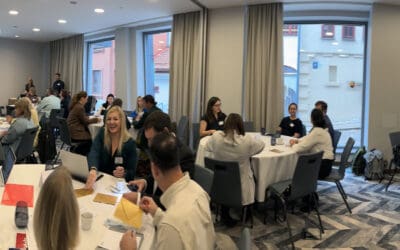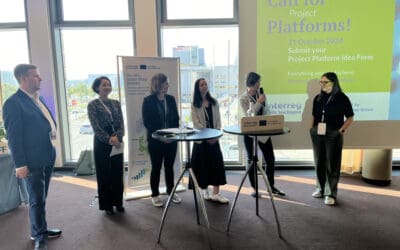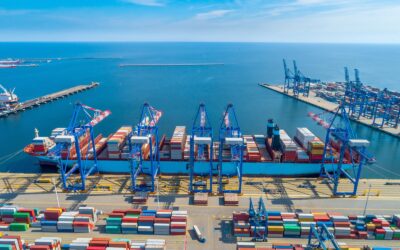
8 January 2024
More projects help implement the action plan of the EU Strategy for the Baltic Sea Region
Written by Elena Kolosova
The small and core projects selected for funding last year are now under contract and have started their activities bringing a positive change in our region. These projects are instrumental in achieving the ambitious objectives of the EU Strategy for the Baltic Sea Region (EUSBSR).
Projects are inspiring for change
These 13 small and 24 core projects drive the transition to a green and resilient Baltic Sea region. They inspire sustainable solutions that work. By pooling the expertise of organisations across the Baltic Sea, projects ensure that these solutions are tailored to the specific needs of our region. These projects also help achieve the goals of the pan-Baltic strategies, including the EU Strategy for the Baltic Sea Region (EUSBSR).
Interreg projects support the implementation of the EUSBSR actions
EUSBSR policy area Bioeconomy
Projects help strengthen bioeconomy and circular bioeconomy in the region. They are vital for achieving better sustainability and productivity in the region as addressed by policy area (PA) Bioeconomy. Project partners actively work with neglected regional bioresources and establish new supply chains. In the project MainPotRe, partners focus on scaling up the cultivation and consumption of local heritage varieties of potatoes, while the RoundGoby project promotes commercial fishing of Round Goby. These projects contribute to food security in the region by emphasising local production and self-sufficiency. In line with the principles of circular bioeconomy, the partners of the project Circular FoodShift optimise regional food systems through circular and zero-waste cooking solutions in public events, festivals, and schools. The project FoodLoops focuses on improving biowaste separation at source and transforming unavoidable food waste into valuable products like organic compost.
EUSBSR policy area Energy
Projects help streamline efforts on energy efficiency in the region by deepening regional cooperation, one of the focus areas of PA Energy. In the project Climate-4-CAST, partners introduce municipal climate budgeting which enables climate commitments to be translated into funded and measurable actions. Projects also address energy consumption in buildings by testing cost-effective and easy-to-implement solutions. The Easy Energy project explores low-tech solutions for municipal institutions and small companies that can be implemented quickly without high investments. In the CCI4Change project, partners aim at behavioural change among residents to increase energy efficiency and reduce energy consumption.
EUSBSR policy area Nutri
Projects test solutions to reduce nutrient emissions and recycle nutrients, the priorities in PA Nutri. In the project City Blues, partners implement nature-based solutions in urban watersheds to effectively manage urban floods and stormwater. In the project Supported by Nature, partners focus on implementing nature-based solutions in nature reserves to prevent nutrient leaching into the Baltic Sea. Project partners collaborate with farmers to reduce phosphorus load through soil amendments in the project GYPREG. In the project CiNURGi, partners develop standards for safe and sustainable recycling of nutrients and production of recycled nutrient fertilisers, together with farmers’ interest groups and farm advisory services.
EUSBSR policy area Transport
Projects develop solutions for climate-neutral and zero-pollution transport, the priorities in PA Transport. In the project UrbFRail, partners enable revitalisation of inner-urban freight rail hubs, to shift goods from road to rail and to make last-mile transport more sustainable. The project BSR HyAirport encourages the use of renewable energy in the field of aviation. Further, the partners in the BATS project work to increase active mobility in adverse (winter) conditions.
EUSBSR policy areas Ship and Safe
Projects develop solutions for clean and safe shipping in the Baltic Sea, the focus areas of PAs Ship and Safe. In the project OpenRisk II, partners develop risk management tools that aid preventing maritime accidents and enhancing preparedness and response to oil spill accidents. Project partners collaborate to produce the next generation of navigational products and services for ships in the project Baltic Sea e-Nav. Other partnerships facilitate digital information sharing and messaging services for fairway users in the project MADAME, and establish alternative positioning services in the project ORMOBASS. These projects help enhance the navigational capabilities of ships in the Baltic Sea and optimise their routes, reduce fuel consumption, and so minimise their environmental impact.
EUSBSR policy area coordinators support the project partners
The policy area coordinators of the EUSBSR facilitate connections between the projects, public administrations, and thematic experts in the region. This collaboration results in wider outreach and increased visibility for the projects. This collaboration helps also ensure that the solutions developed by these projects become an integral part of the work conducted by various organisations in the region.
Check out more !
All of the 37 projects selected in the second calls of the Programme make smaller or bigger steps in bringing the ambitious goals of the EU Strategy for the Baltic Sea Region closer. These projects contribute also to further policy areas of the EUSBSR: Culture, Hazards, Education, Health, Innovation, Tourism, and Spatial Planning. You can learn more about them in our Project library.
More news
From shaping applications to shaping the region’s future!
Almost 50 dedicated applicants met in Riga, Latvia, on 26 September, to dive deep into the nature of project platforms, the Programme’s main capitalisation instrument, and finetune their applications.
Committed to the region, together!
The Kiel Fjord glittering in the sunshine, ships sounding their horns and seagulls squawking provided yet another perfect Baltic Sea backdrop for the 32nd Annual Conference of the Baltic Sea States Subregional Co-operation (BSSSC) on the 19-20 September 2024. On 20 September, the Interreg Baltic Sea Region team organised a workshop at the conference.
Collaborating for Enhanced Resilience: Maritime Example
Discover how Interreg Baltic Sea Region projects are revolutionising maritime safety. Such innovative approaches are essential for ensuring safe navigation in the Baltic Sea.
Collaborating for Enhanced Resilience: Social Example
Discover how Interreg Baltic Sea Region projects are enhancing social resilience. Together, these initiatives are crucial for building a stronger Baltic Sea region.






